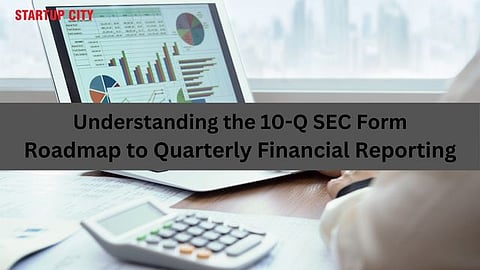

Publicly traded companies must transparently disclose detailed financial performance to shareholders and the public. This obligation is met through filings with the Securities and Exchange Commission (SEC), notably the crucial SEC Form 10-Q. In this article, we will explore what SEC Form 10-Q entails, its filing deadlines, and its important components.
SEC Form 10-Q serves as a detailed quarterly financial report submitted by all publicly traded companies to the SEC. It presents a summary of a company's financial status for a particular quarter, revealing details about its revenues, expenditures, and overall operational condition.
Unlike the yearly Form 10-K, Form 10-Q is usually unaudited, providing investors with a timely snapshot of the company's financial standing.
The filing deadlines for SEC Form 10-Q vary depending on the size of the public float, which represents the portion of outstanding stock available to the public. Large accelerated filers, with a public float of $700 million or more, must submit their forms within 40 days after the quarter ends.
Similarly, accelerated filers, having a public float between $75 million and $700 million, must adhere to the 40-day deadline.
Non-accelerated filers, which include companies with a public float of less than $75 million, are given 45 days from the quarter's end to file their 10-Q. Failure to meet these deadlines can result in significant consequences, such as the potential loss of SEC registration and legal repercussions.
SEC Form 10-Q is divided into two primary sections. The initial part contains condensed financial statements, management discussions and analyses, disclosures regarding market risks, and insights into internal controls.
The subsequent section includes additional relevant information, such as details on legal proceedings, unregistered sales of equity securities, and defaults upon senior securities. Together, these sections offer stakeholders a comprehensive overview of the company's financial and operational status.
SEC Form 10-Q plays a crucial role as a tool for investors to assess a company's quarterly performance and make well-informed decisions. By scrutinising the information provided in the 10-Q, investors can monitor fluctuations in earnings, evaluate operational effectiveness, and pinpoint potential risks and opportunities.
Furthermore, the ability to compare a company's 10-Q reports across various quarters empowers investors to gauge its trajectory and stability, thereby assisting in the formulation of effective investment strategies.
Apart from SEC Form 10-Q, public companies must submit several other critical reports to the SEC, including:
Form 10-K: This annual report offers a comprehensive overview of the company's performance, encompassing financial statements, management forecasts, and legal matters.
Form 8-K: Filed for noteworthy developments or alterations not addressed in the 10-Q or 10-K reports, such as asset transactions, executive changes, or corporate reorganisations.
Annual Report: This yearly summary provides in-depth insights into the company's operations, financial statements, and communications from its leadership.
In summary, SEC Form 10-Q serves as a cornerstone for fostering transparency and accountability in the financial reporting of public companies. Through timely filing and thorough disclosures, companies ensure stakeholders have access to precise information for informed decision-making.
Investors can utilise SEC Form 10-Q and other filings to evaluate companies' financial well-being, thereby enhancing transparency and efficiency in the capital market ecosystem.